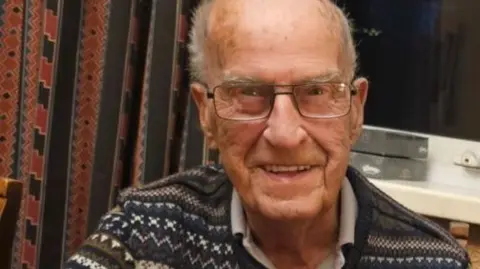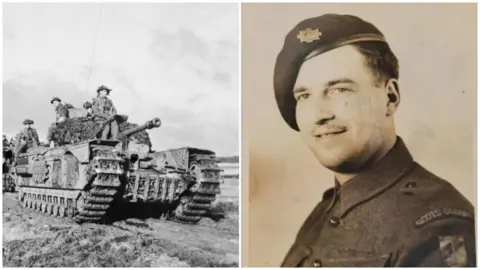WW2 tank driver stopped on VE Day by flat battery
 Walter Foster
Walter FosterA World War Two tank driver remembers having to a get a tow because his tank's battery was flat when he heard news of the end of the war in Europe.
"I thought: What the hell am I doing here'?" Walter Foster laughed.
Ahead of events to mark the VE Day on Thursday, he was awarded a special certificate signed by the Colonel of Scots Guard Regiment, the Duke of Edinburgh, on the occasion of his 100th birthday.
"I can only say that I feel really humble," said the retired nurse from Llanishen, Cardiff, who parachuted into France on D-Day, got wounded in the leg, before driving tanks all the way to Germany and the liberation of the Bergen-Belsen concentration camp.
"It was so upsetting," he said of the the Holocaust survivors he saw.
"They were just skeletons and although we opened the gates for them they didn't move... they just sat down or lolled and didn't get up. How they were alive I don't know.
"It broke my heart to see that."
The last day of the war was bittersweet for the then 20-year-old driver, losing a tank commander who "went berserk" after hearing the war was over.
"He went running up the street with a Bren gun and he was riddled by this number 88 that tore him off the ground and that was in my memory."
He said his tank and crew were pinned down by the enemy at the time.
"When I eventually tried to get out I found my tank wouldn't start, I had a flat battery.
"I had to be towed out at the same time listening on the wireless that the war's over and I thought: 'What the hell am I doing here'?"
 Walter Foster
Walter FosterHe parachuted into France and fought in fierce tank battles near Caen.
Along the way he saw soldiers bodies mummified from being left so long on the battlefield: "It was a very traumatic time."
What is Walter's message to young people today?
"The most important thing is to be proud of your country, all of it, and if necessary be prepared to defend it to the utmost," he said.
On behalf of Scots Guards, officer Ronnie Wilkie told Mr Foster: "We are all exceptionally proud of you and your service."
